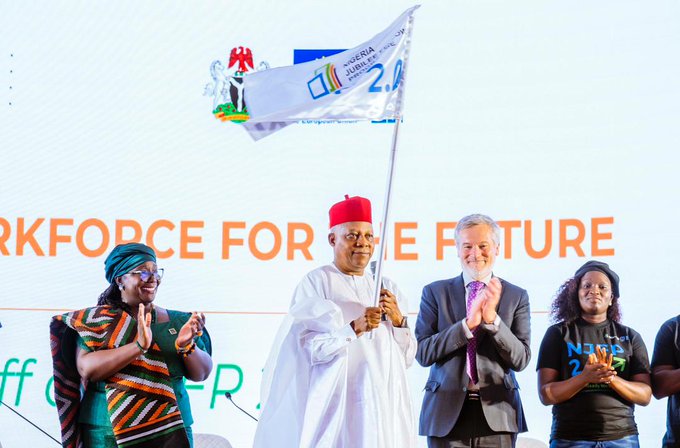The Federal Government, FG, has announced a plan to invest $220 million to generate job opportunities for young citizens through the second phase of the Nigeria Jubilee Fellows Programme (NJFP) 2.0.
This major initiative is a collaboration with the European Union (EU) and the United Nations Development Programme (UNDP).
Vice President Kashim Shettima launched the NJFP 2.0 at the Presidential Villa in Abuja on Wednesday.
READ ALSO: FG unveils cancer immunotherapy project, enrols first Nigerian patient
He stated that the program’s core objective is “to bridge the transition gap between learning and earning” for thousands of graduates who have the education but lack the opportunity for real-world experience.
Shettima explained that the investment aims to connect high-potential graduates with valuable work experience, training, and mentorship, thereby transforming the nation’s large youth population “into productive economic power.”
He stressed that the administration of President Bola Ahmed Tinubu is committed to ensuring the program’s longevity by integrating it into national planning and budgeting frameworks
“Our immediate goal is to raise $220 million,” he said, characterizing it not as charity but as an investment in the nation’s most valuable asset: our young people.
He called on the private sector, development community, and donor ecosystem to contribute to the NJFP Basket Fund to create a sustainable financing mechanism for the program’s future.
He urged partners to view the launch as an opportunity to demonstrate that youth employment is a shared responsibility and noted that aligning resources and intentions creates a significant multiplier effect for the economy.
Shettima highlighted that inclusivity will be central to the NJFP 2.0 design.
Recognising the diverse backgrounds of Nigerian youth, he stated that the next phase will intentionally reach every corner of the country.
Placements will be strategically aligned with sectors critical to the nation’s economic future: agriculture, renewable energy, digital technology, manufacturing, and the creative industries.
Shettima expressed optimism that the NJFP 2.0 will be a success story of how Nigeria utilizes its demographic advantage to create a generation of productive citizens who build enterprises and shape the nation’s future.
He added that young Nigerians are not seeking handouts, but a fair system that rewards merit and provides opportunity.
The Minister of Youth Development, Ayodele Olawande, hailed the NJFP 2.0 as a continuation of successful youth empowerment efforts.
He noted that since the program began in 2021, over 13,000 youths have already gained skills.
The long-term objective is to place 100,000 youths in jobs within five years.
Elsie Attafuah, Resident Representative of the UNDP in Nigeria, acknowledged the generous funding from the EU and UNDP’s implementation support, stating that the vision has already resulted in over 40,000 Nigerians being placed in various economic sectors.
She stressed the continued necessity of the NJFP platform for millions of Nigerians to thrive.
The European Union Ambassador to Nigeria, Gauthier Mignot, affirmed the EU’s support and expressed an eagerness to see the NJFP 2.0 fully integrated into Nigeria’s governance agenda to guarantee its sustainability.
READ ALSO: FG launches NJFP 2.0, targets 20,000 annual jobs for graduates
Adding a private sector perspective, Abubakar Suleiman, CEO of Sterling Bank, delivered the keynote address, emphasizing that millions of Nigerians could capably perform jobs currently outsourced to foreign companies if given opportunities like those under the NJFP.
He urged stakeholders not to overlook the millions of graduates who require this support to transition into gainful employment.



